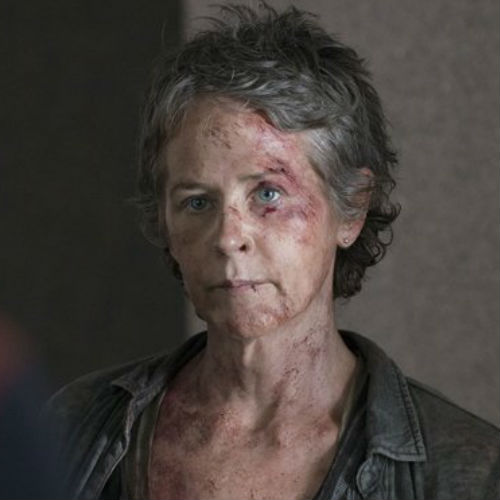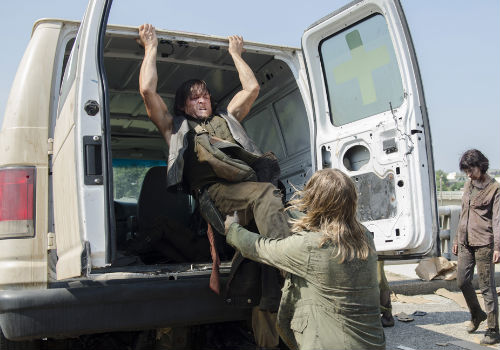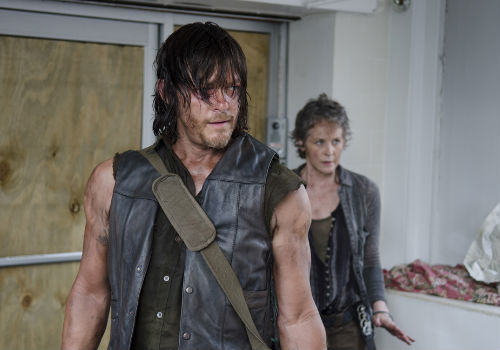
* BEWARE OF SPOILERS … AND ZOMBIES … AND THINGS FALLING (EVEN IF YOU MAKE GOOD TIME) *
The Walking Dead has remarked more than once on the transformative effects of the zombie apocalypse, siding usually with the fact that it is NOT a Good Thing.
This stands to reason since killing your fellow man, even if it’s in the interests of your own survival, and fending off the, well, walking dead, does tend to have a corrosive effect on your soul (not to mention what the lack of social niceties, rule of law and tickets to the opera will do to a person).
If the apocalypse inspired a book, and its author – who frankly should be collecting food and knifing zombies through the head rather than writing; or should they? After all, Beth still songs so why shouldn’t someone still write? – taking its inspiration from the classics, it would likely title its tome It Was the Worst of Times, and the Even More Worse of Times, and everyone living through what feels like the end of days would nod in solemn agreement … and go back to shredding what little was left of their humanity.
One person might disagree with this bleak assessment though, and that person would be Daryl (Norman Reedus), a man who has more reason than most to side with the Glass is Half Empty school of apocalyptic assessment given the number of people he has lost to walkers and his fellow human beings.
Somehow, despite a pre-apocalyose history of being at the brutalised receiving hand of domestic abuse, losing countless friends, and his brother Merle (Michael Rooker) during the apocalypse, and in “Consumed”, finding himself without weapons with which to defend himself in the eerie rubbish-strewn confines of a wrecked downtown Atlanta, he believes that it is still worth “trying” to hang in there.
After all, as he reminds Carol (Melissa McBride) after a passionate speech by her on the overwhelmingly consuming effects of the dark and soulless times in which they live, they ain’t dead yet and hence are therefore still ahead on points:
Carol: “Me and Sofia stayed in that room [at the women’s refuge they shelter in at one point] for a day and a half before I went running back to Ed. I went home, I got beat up. Life went on and I keep praying for something to happen. But I didn’t do anything. Not a damn thing. Who I was with him got burned away and I was happy about that … Well, not happy … And at the prison, I got to be who I always though I should be. What I shoulda been … and then she got burned away. Everything now consumes you.”
Daryl [pauses and then says]: “We ain’t ashes.”

It’s not that Daryl has suddenly become the Blue Bird of Happiness of upbeat zombie apocalypse survivors; simply that in his own homespun, matter-of-fact way, an outlook which has grown as he has matured over the last five years – Carol remarks at one point that “You were a kid. Now you’re a man” – he has come to realise that the simple act of being alive means you get to choose to survive, to save others, to find missing friends (such as Beth) and even rescue complete strangers.
Carol, a character who has likely grown the most out of anyone in their group during the five seasons of The Walking Dead, knows this all, of course (lone Terminus-busting messiah anyone?); but worn down by setback after setback – her speech comes after Beth’s escaped friend from the hospital Noah (Tyler James Williams) has relieved them of their weapons, leaving more than a little vulnerable and in Carol’s case, temporarily pessimistic – she’s prone to forget the enormity of the lessons learnt.
Which is why Daryl, which whom she has formed a bond akin to that of siblings who have lived through the most harrowing of abuse and survived; theirs is the bond of shared experience of the worst kind (the ties which bind them are more familial than romantic; sorry “Caryl” devotees) has to step in to remind her from time to time.
Carol: “Without weapons we could die. Beth could die.”
Daryl: “We’ll find more weapons.”
Carol: “I don’t want you to die. I don’t want Beth to die. I don’t want anyone at the church to die. But I can’t stand around and watch it happen either. I can’t. That’s why I left. I just had to be somewhere else.”
Carol: Well, you ain’t somewhere else, you’re right here … TRYING.”
Daryl: ” You’re not who you were and neither am I.”
“Consumed” goes to great lengths to remind us of just how much Carol has been through though via judiciously-placed flashbacks which take us back to her exile by Rick (Andrew Lincoln), where she puts on a brave front but breaks down in grief a little while down the road, her witnessing of the fires from the prison battle (she arrives too late to help), the burying of sisters Lizzie (Brighton Sharbino) and Myka (Kyla Kennedy), and the aftermath of the storming of Terminus where she is shown, utterly spent, wiping the blood of her zombie camouflage off her person.
Most tellingly though, by virtue of the fact that she and Daryl have to shelter overnight in the women’s refuge she very briefly called home, we come to understand all the more how deeply years of abuse and neglect by Ed impacted her psyche in the most deleterious and corrosive of ways.
Yes, she has risen well above all this and yes it has all been burned away as she observed, but it is hard to completely erase the scars, to keep coming back time and again in a world which knows nothing of happily ever afters and new starts, and plenty about the ending of all good things.

Visually “Consumed, which sees Daryl and Carol doggedly tracking the car bearing the white crosses through the Georgian countryside into the broken-down overgrown mess that is what’s left of downtown Atlanta and the hospital where Beth is imprisoned by what is best described as a misguided mercy cult of sorts, repeats with great effectiveness the motif of fire.
You see it in Carol’s various flashbacks, and in the flaming writing pad that Daryl uses to distract a herd of zombies so they could reach a building they need to get into to spy on the hospital; over and over again in the most poetic and emphatic ways you are reminded of the burning away that Carol refers to, of the consuming of old things and the phoenix-like rebirth of the new.
You are also painfully reminded that it’s a process that goes on and on and on, a continuous process of renewal in the midst of more death and destruction than anyone has ever seen, and it’s unceasing nature, as Carol rightly observes, can be a lot to bear, almost too much at times.
Carol: “[You] said we get to start over.”
Daryl: “Yeah …”
Carol: “Did you?”
Daryl: “I’m trying [Carol contemplatively stares out the window into the night] … why don’t you say what’s really on your mind?”
Carol: “I don’t think we get to save people anymore.”
Daryl: “Why you here?”
Carol: “I’m trying.”
But as Daryl reminds her, all they can do is hang on and try.
It’s a rare message of hope where there should be none, a reaffirmation that the reason that everyone in Rick’s group is still “trying” is because against all the odds, they still have that rarest and most precious of commodities – HOPE.
(And a sense of humour it seems as some of the wryly, witty lines in “Consumed” made clear – after she and Daryl were forced to flee a herd of zombies on a bridge by tipping an ambulance onto the ground below, Carol quips “We made good time down”; earlier when they are forced to squeeze through the narrowest of spaces to get where they need to go, Daryl jokes “Good thing we skipped breakfast this morning.”)
And their hope is often justified.
While Noah does steal their weapons at first, they are able to steal them back, show him some mercy – there is also another touching scene where Daryl kills and respectfully burns the sheet-shrouded bodies of a zombiefied mother and child trapped in one of the refuge’s rooms, all while Carol, who wanted to show them mercy earlier, sleeps – and gain what they most needed – information on where Beth is and how to get to her.
Granted “Consumed”, one of the strongest, most poignant and emotionally-resonant of The Walking Dead‘s episodes to date, doesn’t end on the most hopeful of notes with Carol badly injured and in the hands of the hospital psychos – the look on Daryl’s face as he and Noah are forced flee the city to get help is heartbreaking – but it establishes again and again through masterfully-executed visual cues, and some astonishingly open and soul-laid-bare dialogue, that while they are alive, hope indeed remains.
Even in the middle of the zombie apocalypse.
* Hope feeling a little dented by the ending of “Consumed”? Fear not! As the promo trailer (+ some sneak peeks) for next week’s episode “Crossed” makes clear, Rick and the tribe are on the case, ready to rescue Carol and Beth, regardless of the odds …